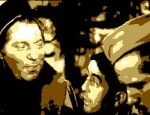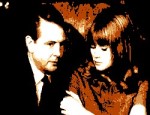Film Review
John Mills is on cracking form in this taut mystery thriller, playing
the kind of driven, slightly unorthodox crime investigator that would
become endemic in police procedurals in the decades to come.
Plot-wise,
Town on Trial is
somewhat lacking (once you have eliminated the obvious suspects it's
pretty clear who the killer is), but it is superbly well-cast and
directed with considerable flair by John Guillermin, a stalwart of
British cinema who would later go on to helm such popular classics as
I Was Monty's Double (1958),
The Towering Inferno (1974) and
Death on the Nile (1978).
Guillermin's penchant for dramatic tension serves him well
(particularly in the nerve-racking climax) for what is assuredly one of
his slickest and most compelling films.
Town on Trial may be a pretty
conventional whodunit, but it is ahead of its time in at least two
respects - it anticipates the psycho-thriller that would become highly
popular after Hitchcock's
Psycho (1960) and flags up what
has become a very real concern today: the extent to which the police
should be permitted ride roughshod over the freedoms of the
individual. For its stylisation, the film takes some of its
inspiration from American film noir, most visibly in its extensive use
of point-of-view shots, which bring a potent aura of menace and
foreboding. The distinguished cast includes Charles Coburn, a
well-known American character actor, no doubt brought in to help
overseas sales of the film, and several familiar British faces - Derek
Farr, Fay Compton and Dandy Nichols (the future long-suffering wife of
Alf Garnett).
Town on Trial
is a fine example of 1950s British thriller, and a genuine eye-opener
for today's liberated teenagers.
© James Travers 2012
The above content is owned by frenchfilms.org and must not be copied.
Film Synopsis
Oakley Park is a small English town, a town that is like so many others
- until the fateful day when a young woman is strangled on her way home
one evening. Investigating the murder, Superintendent Mike
Halloran soon identifies four likely suspects. First, there is
Peter Crowley, the victim's former boyfriend, an educated young man who
suffers from recurring headaches. Then there is Dr Fenner,
a Canadian medical practitioner who is keen to forget his past and who
appears eager to incriminate others. The influential Mr Dixon
incriminates himself by the hostility with which he reacts to
Halloran's line of questioning, but the most likely suspect is Mark
Roper, a married man who was having an affair with the victim shortly
before she died. Halloran's methods soon arouse ill-feeling but
the superintendent is determined to crack the case. When another
woman is murdered he realises it is only a matter of time before the
killer will strike again...
© James Travers
The above content is owned by frenchfilms.org and must not be copied.



